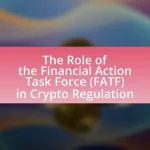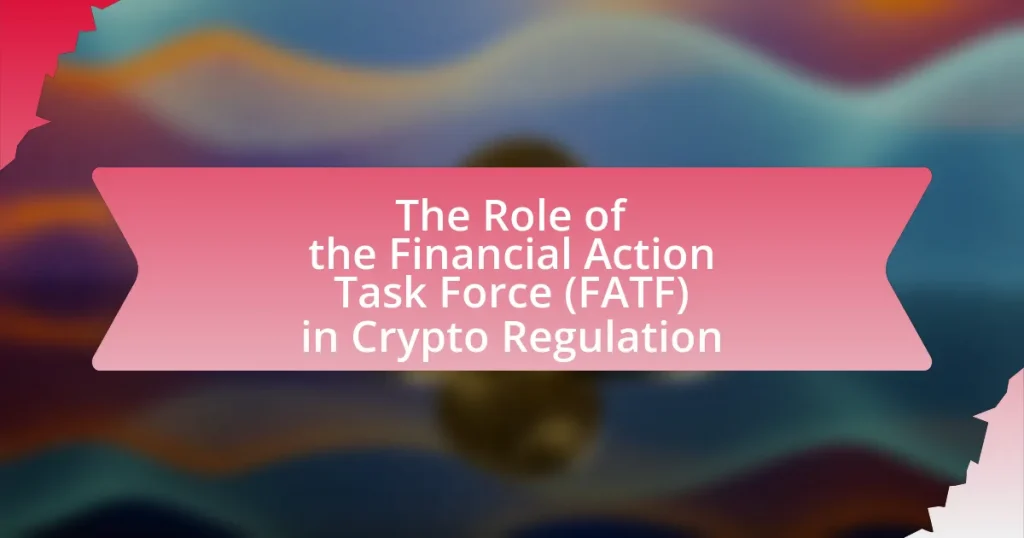The Financial Action Task Force (FATF) is an intergovernmental organization established in 1989 to combat money laundering and terrorist financing by setting international standards and promoting effective regulatory measures. This article explores the FATF’s role in shaping global financial regulations, particularly concerning cryptocurrencies, by outlining its recommendations, compliance requirements, and the implications for member countries and businesses. It also addresses the challenges the FATF faces in regulating decentralized digital assets and the impact of its guidelines on national legislation and international cooperation in the crypto sector. Additionally, the article discusses future developments in FATF’s regulatory approach as emerging technologies continue to evolve.
--The-Financial-Action-Task-Force-(FATF)-is-an-intergo-1.webp)
What is the Financial Action Task Force (FATF)?
The Financial Action Task Force (FATF) is an intergovernmental organization established in 1989 to combat money laundering and terrorist financing. The FATF sets international standards and promotes measures to ensure effective implementation of legal, regulatory, and operational measures for combating these financial crimes. Its recommendations are recognized as the global standard for anti-money laundering (AML) and counter-terrorist financing (CFT) efforts, influencing national policies and regulations across member countries. The FATF’s effectiveness is evidenced by its mutual evaluation process, which assesses countries’ compliance with its standards and provides guidance for improvement.
How was the FATF established and what are its main objectives?
The Financial Action Task Force (FATF) was established in 1989 by the G7 countries to combat money laundering and terrorist financing. Its main objectives include setting international standards to prevent these financial crimes, promoting effective implementation of legal, regulatory, and operational measures, and assessing the effectiveness of countries’ anti-money laundering and counter-terrorist financing systems. The FATF also aims to enhance global cooperation and coordination among its member countries to address emerging threats in the financial system.
What role does the FATF play in combating money laundering and terrorist financing?
The Financial Action Task Force (FATF) plays a crucial role in combating money laundering and terrorist financing by establishing international standards and promoting effective implementation of legal, regulatory, and operational measures. The FATF develops recommendations that member countries are encouraged to adopt, which include guidelines for identifying and reporting suspicious transactions, enhancing customer due diligence, and improving international cooperation among law enforcement agencies. As of 2023, the FATF has 39 member jurisdictions, and its recommendations are recognized as the global standard for anti-money laundering (AML) and counter-terrorist financing (CFT) efforts, influencing national legislation and regulatory frameworks worldwide.
How does the FATF influence global financial regulations?
The Financial Action Task Force (FATF) influences global financial regulations by establishing international standards aimed at combating money laundering and terrorist financing. These standards, known as the FATF Recommendations, provide a framework that countries are encouraged to adopt, thereby promoting consistency in regulatory practices worldwide. As of 2023, over 200 jurisdictions have committed to implementing these recommendations, which include measures such as customer due diligence and reporting suspicious transactions. The FATF also conducts mutual evaluations to assess compliance, thereby holding countries accountable and incentivizing them to enhance their regulatory frameworks. This collective approach fosters cooperation among nations, ultimately shaping the global financial landscape and ensuring that financial systems are resilient against illicit activities.
What is the significance of the FATF’s recommendations?
The significance of the FATF’s recommendations lies in their role in establishing global standards for combating money laundering and terrorist financing, which directly impacts the regulation of cryptocurrencies. These recommendations provide a framework that countries must follow to ensure that their financial systems are not exploited for illicit activities, thereby promoting transparency and accountability in the crypto sector. For instance, the FATF’s guidelines require virtual asset service providers to implement customer due diligence measures, which helps mitigate risks associated with crypto transactions. This framework has been adopted by over 200 jurisdictions, reinforcing its importance in shaping international regulatory practices and enhancing cooperation among countries to address the challenges posed by digital currencies.
How do FATF recommendations impact member countries?
FATF recommendations significantly impact member countries by establishing a framework for combating money laundering and terrorist financing. These recommendations compel member countries to implement stringent regulatory measures, such as enhancing customer due diligence, reporting suspicious transactions, and ensuring compliance with international standards. For instance, the FATF’s 40 Recommendations serve as a guideline for countries to develop their anti-money laundering (AML) and counter-terrorist financing (CTF) policies, which are essential for maintaining global financial integrity. Countries that fail to comply risk being placed on the FATF’s “grey” or “black” lists, which can lead to economic sanctions and reduced foreign investment, as evidenced by the experiences of countries like Iran and North Korea.
What are the consequences for countries that do not comply with FATF standards?
Countries that do not comply with FATF standards face significant consequences, including being placed on the FATF’s “grey list” or “black list.” Being on the grey list can lead to increased scrutiny from international financial institutions, reduced foreign investment, and potential sanctions. For instance, countries on the grey list may experience limitations in accessing international financial markets, which can hinder economic growth. The black list, on the other hand, results in severe restrictions, including trade sanctions and isolation from the global financial system, as seen with North Korea and Iran. These measures are designed to pressure non-compliant countries to improve their anti-money laundering and counter-terrorism financing frameworks.
-approac-2.webp)
How does the FATF approach cryptocurrency regulation?
The Financial Action Task Force (FATF) approaches cryptocurrency regulation by establishing guidelines that require countries to implement measures aimed at combating money laundering and terrorist financing in the crypto space. Specifically, the FATF recommends that jurisdictions apply the same anti-money laundering (AML) and counter-terrorist financing (CTF) regulations to virtual assets and service providers as they do to traditional financial institutions. This includes the “Travel Rule,” which mandates that virtual asset service providers share customer information during transactions. The FATF’s 2019 guidance emphasizes the need for countries to assess risks associated with cryptocurrencies and to ensure that appropriate regulatory frameworks are in place to mitigate these risks effectively.
What are the key challenges the FATF faces in regulating cryptocurrencies?
The key challenges the FATF faces in regulating cryptocurrencies include the decentralized nature of digital assets, which complicates the identification of responsible parties, and the rapid evolution of technology that outpaces regulatory frameworks. Additionally, the global disparity in regulatory approaches among member countries creates inconsistencies in enforcement and compliance. For instance, while some jurisdictions have implemented strict regulations, others remain lax, leading to regulatory arbitrage. Furthermore, the anonymity features of many cryptocurrencies hinder the FATF’s ability to trace transactions, making it difficult to combat money laundering and terrorist financing effectively.
How does the decentralized nature of cryptocurrencies complicate regulation?
The decentralized nature of cryptocurrencies complicates regulation by creating challenges in identifying responsible parties and enforcing compliance. Unlike traditional financial systems, where centralized institutions can be held accountable, cryptocurrencies operate on a peer-to-peer network, making it difficult for regulators to impose rules and monitor transactions effectively. This lack of central authority means that users can transact anonymously, which hinders efforts to prevent illicit activities such as money laundering and fraud. Additionally, the global nature of cryptocurrencies means that regulatory measures in one jurisdiction may not be effective in another, leading to regulatory arbitrage where users exploit less stringent regulations.
What specific risks do cryptocurrencies pose in terms of money laundering and terrorist financing?
Cryptocurrencies pose specific risks for money laundering and terrorist financing due to their pseudonymous nature, ease of cross-border transactions, and lack of regulatory oversight. The pseudonymity allows users to obscure their identities, making it difficult for authorities to trace illicit activities. Additionally, the rapid and borderless nature of cryptocurrency transactions facilitates the movement of funds across jurisdictions, complicating enforcement efforts. A report by the Financial Action Task Force (FATF) highlights that the decentralized structure of many cryptocurrencies can be exploited by criminals to transfer value without detection, increasing the potential for money laundering and financing of terrorism.
What guidelines has the FATF issued regarding virtual assets?
The Financial Action Task Force (FATF) has issued guidelines regarding virtual assets that emphasize the need for countries to implement measures to combat money laundering and terrorist financing. These guidelines include the recommendation that virtual asset service providers (VASPs) be regulated and registered, and that they comply with the same anti-money laundering (AML) and counter-terrorist financing (CTF) obligations as traditional financial institutions. The FATF also stresses the importance of conducting customer due diligence, reporting suspicious transactions, and maintaining records. These guidelines were formalized in the FATF’s 2019 report, which outlines the risks associated with virtual assets and the necessary regulatory responses to mitigate those risks.
What are the main components of the FATF’s guidance on virtual assets?
The main components of the FATF’s guidance on virtual assets include risk-based approaches, customer due diligence, and the application of anti-money laundering (AML) and counter-terrorism financing (CTF) measures. The FATF emphasizes that countries should assess the risks associated with virtual assets and implement appropriate regulatory frameworks to mitigate these risks. Additionally, the guidance mandates that virtual asset service providers (VASPs) conduct customer due diligence, report suspicious activities, and maintain records to ensure compliance with AML and CTF obligations. These components are designed to enhance the integrity of the financial system and prevent illicit activities associated with virtual assets.
How do these guidelines affect cryptocurrency exchanges and service providers?
The guidelines set by the Financial Action Task Force (FATF) significantly impact cryptocurrency exchanges and service providers by imposing stringent compliance requirements aimed at preventing money laundering and terrorist financing. These guidelines mandate that exchanges implement robust customer due diligence (CDD) measures, including identity verification and transaction monitoring, to ensure that they can identify and report suspicious activities. For instance, the FATF’s “Travel Rule” requires exchanges to share customer information during transactions, which enhances transparency and accountability in the crypto space. Compliance with these guidelines is crucial, as failure to adhere can result in severe penalties, including fines and operational restrictions, thereby influencing the operational frameworks of exchanges and service providers.
What is the global impact of FATF’s crypto regulations?
The global impact of FATF’s crypto regulations is significant, as they establish a framework for combating money laundering and terrorist financing in the cryptocurrency sector. By requiring countries to implement these regulations, FATF promotes international cooperation and standardization, which enhances the integrity of financial systems worldwide. For instance, the FATF’s guidelines have led to over 100 jurisdictions adopting measures to regulate virtual assets, thereby increasing transparency and accountability in the crypto market. This regulatory push has also influenced major exchanges to adopt Know Your Customer (KYC) practices, further mitigating risks associated with illicit activities.
How do FATF regulations influence national legislation on cryptocurrencies?
FATF regulations significantly influence national legislation on cryptocurrencies by establishing a global framework for anti-money laundering (AML) and combating the financing of terrorism (CFT) that member countries are encouraged to adopt. These guidelines compel nations to implement specific measures, such as requiring cryptocurrency exchanges to register and comply with AML/CFT obligations, thereby shaping their legal frameworks to align with FATF standards. For instance, the FATF’s 2019 guidance on virtual assets prompted many countries, including the United States and the European Union, to enhance their regulatory approaches to cryptocurrencies, ensuring that they address risks associated with illicit activities. This alignment not only promotes international cooperation but also fosters a more secure environment for cryptocurrency transactions, as countries that fail to comply may face economic sanctions or be placed on the FATF’s grey or black lists.
What examples exist of countries adapting their laws in response to FATF guidelines?
Countries such as the United Kingdom, Australia, and Japan have adapted their laws in response to FATF guidelines. The United Kingdom implemented the 5th Anti-Money Laundering Directive, which includes provisions for virtual asset service providers to register and comply with AML/CFT regulations. Australia amended its Anti-Money Laundering and Counter-Terrorism Financing Act to include cryptocurrency exchanges, requiring them to register with AUSTRAC and adhere to reporting obligations. Japan established a licensing system for cryptocurrency exchanges under its Payment Services Act, ensuring compliance with FATF recommendations on customer due diligence and transaction monitoring. These adaptations demonstrate a commitment to aligning national laws with international standards set by the FATF.
How do FATF recommendations shape international cooperation on crypto regulation?
FATF recommendations shape international cooperation on crypto regulation by establishing a standardized framework for countries to combat money laundering and terrorist financing in the cryptocurrency sector. These recommendations, particularly the “Travel Rule,” require virtual asset service providers to share customer information during transactions, promoting transparency and accountability. As of 2021, over 200 jurisdictions have committed to implementing FATF guidelines, which enhances cross-border collaboration and ensures that countries adopt similar regulatory measures, thereby reducing regulatory arbitrage and fostering a unified approach to crypto oversight.
What are the implications for businesses operating in the crypto space?
Businesses operating in the crypto space face significant implications due to regulatory frameworks established by entities like the Financial Action Task Force (FATF). These regulations require businesses to implement stringent anti-money laundering (AML) and know-your-customer (KYC) protocols, which can increase operational costs and complexity. For instance, the FATF’s guidelines mandate that crypto exchanges and wallet providers verify the identities of their users, leading to enhanced compliance burdens. Failure to adhere to these regulations can result in severe penalties, including fines and restrictions on operations, as evidenced by the enforcement actions taken against non-compliant firms in various jurisdictions. Thus, the implications for businesses include increased regulatory scrutiny, potential financial liabilities, and the necessity for robust compliance infrastructures.
How can businesses ensure compliance with FATF regulations?
Businesses can ensure compliance with FATF regulations by implementing robust anti-money laundering (AML) and counter-terrorism financing (CTF) measures. This includes conducting thorough customer due diligence (CDD), monitoring transactions for suspicious activity, and maintaining accurate records. According to the FATF’s recommendations, businesses must assess and mitigate risks associated with their operations, particularly in the crypto sector, where anonymity can pose challenges. Regular training for employees on compliance requirements and staying updated with changes in regulations further supports adherence to FATF guidelines.
What best practices should crypto businesses adopt to align with FATF guidelines?
Crypto businesses should adopt robust customer due diligence (CDD) practices to align with FATF guidelines. This includes verifying the identity of customers, understanding the nature of their activities, and assessing the risks associated with them. Implementing transaction monitoring systems to detect suspicious activities is also essential, as it allows businesses to report any anomalies to relevant authorities. Furthermore, maintaining comprehensive records of transactions and customer interactions supports compliance and facilitates audits. According to the FATF’s 2019 guidance, these practices are critical for mitigating risks related to money laundering and terrorist financing in the cryptocurrency sector.
What future developments can we expect from the FATF regarding crypto regulation?
The Financial Action Task Force (FATF) is expected to enhance its regulatory framework for cryptocurrencies by refining guidelines to address emerging risks and improve compliance among member countries. This includes the potential introduction of stricter requirements for virtual asset service providers (VASPs) to ensure transparency and traceability of transactions. The FATF has already indicated its intention to monitor the implementation of its recommendations and may impose consequences for non-compliance, as seen in its 2021 report highlighting the need for jurisdictions to adopt effective measures against money laundering and terrorist financing in the crypto space.
How might emerging technologies influence FATF’s regulatory approach?
Emerging technologies may significantly influence the Financial Action Task Force’s (FATF) regulatory approach by necessitating updates to existing frameworks to address new risks and opportunities in financial transactions. As technologies such as blockchain, artificial intelligence, and digital currencies evolve, FATF will likely adapt its guidelines to ensure effective anti-money laundering (AML) and counter-terrorism financing (CTF) measures are in place. For instance, the rise of decentralized finance (DeFi) platforms presents unique challenges in tracking transactions, prompting FATF to consider more robust compliance requirements for virtual asset service providers (VASPs). This adaptation is supported by FATF’s ongoing efforts to enhance its guidance on virtual assets, as seen in its 2019 report that emphasized the need for jurisdictions to implement risk-based approaches tailored to technological advancements.
What trends are likely to shape the future of FATF’s engagement with the crypto industry?
The future of FATF’s engagement with the crypto industry is likely to be shaped by increased regulatory clarity, enhanced international cooperation, and the adoption of advanced technologies for monitoring transactions. Regulatory clarity will emerge as jurisdictions implement FATF’s guidelines, leading to standardized compliance measures across countries. Enhanced international cooperation will be driven by the need for a unified approach to combat money laundering and terrorist financing in the crypto space, as evidenced by FATF’s ongoing efforts to engage with member countries and industry stakeholders. Additionally, the adoption of technologies such as blockchain analytics tools will facilitate real-time monitoring of crypto transactions, improving the effectiveness of regulatory frameworks. These trends reflect FATF’s commitment to adapting to the evolving landscape of digital assets while ensuring financial integrity.
The question “
” cannot be answered as it does not provide a specific inquiry or context related to the topic of the Financial Action Task Force (FATF) in crypto regulation. Therefore, it is not possible to provide a concrete answer.













